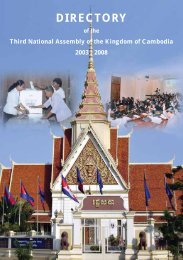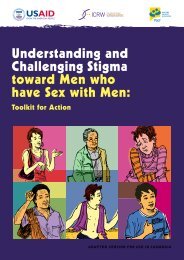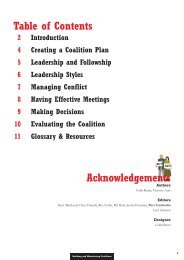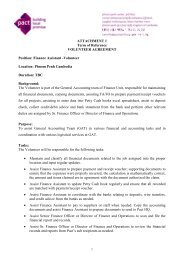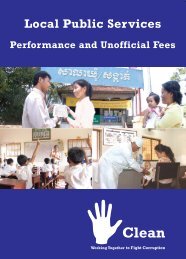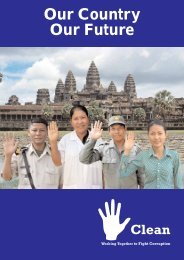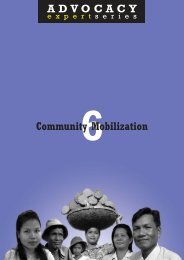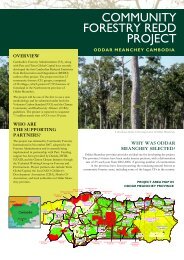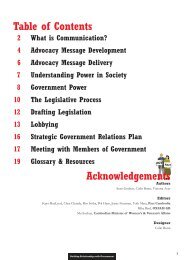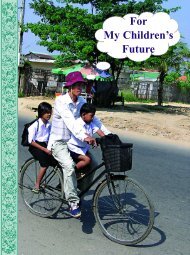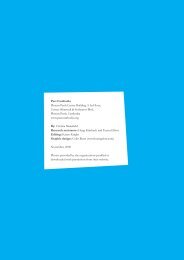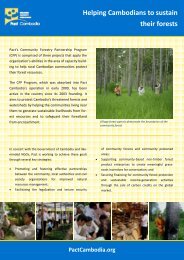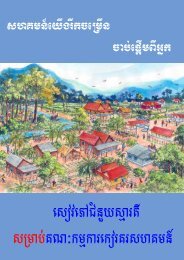Advocacy in Cambodia: Increasing Democratic ... - Pact Cambodia
Advocacy in Cambodia: Increasing Democratic ... - Pact Cambodia
Advocacy in Cambodia: Increasing Democratic ... - Pact Cambodia
Create successful ePaper yourself
Turn your PDF publications into a flip-book with our unique Google optimized e-Paper software.
<strong>in</strong> every four women (25%) aged 15-49 had<br />
experienced domestic violence <strong>in</strong> her lifetime, and<br />
that of this 25%, 66% had experienced domestic<br />
violence <strong>in</strong> the recent past. NGOs considered it a<br />
major success that the M<strong>in</strong>istry of Plann<strong>in</strong>g<br />
<strong>in</strong>cluded domestic violence-related questions <strong>in</strong><br />
the survey. This and other studies have provided<br />
important <strong>in</strong>formation on the domestic violence<br />
situation <strong>in</strong> <strong>Cambodia</strong>, and results have supported<br />
arguments for the need for legislation and<br />
justification for further action.<br />
Currently a number of local organizations<br />
provide shelter, legal services, and re<strong>in</strong>tegration<br />
programs to domestic<br />
violence victims, <strong>in</strong><br />
addition to lobby<strong>in</strong>g for<br />
legislation and rais<strong>in</strong>g<br />
public awareness of the<br />
problem.<br />
Legislation<br />
As mentioned<br />
previously, research to<br />
establish <strong>in</strong>formation on<br />
domestic violence <strong>in</strong><br />
<strong>Cambodia</strong> began <strong>in</strong><br />
1994. The first draft of a<br />
Domestic Violence Law<br />
was produced <strong>in</strong> 1996<br />
and was a collaborative<br />
effort between the<br />
M<strong>in</strong>istry of Women’s<br />
Affairs, PADV, and<br />
UNCHR. At that time, the draft law was submitted<br />
to the Council of M<strong>in</strong>isters, but government<br />
<strong>in</strong>terest waned and no subsequent action was<br />
taken.<br />
In 1998, a group of women’s NGOs began<br />
organiz<strong>in</strong>g a 16-day Campaign aga<strong>in</strong>st Violence<br />
aga<strong>in</strong>st Women, to be attended by the Prime<br />
M<strong>in</strong>ister. Though the Prime M<strong>in</strong>ister <strong>in</strong>itially<br />
expressed skepticism as to the seriousness of the<br />
domestic violence problem, he did attend <strong>in</strong> 1998<br />
and proceeded to attend the next two years’<br />
campaigns as well (by that time the Campaign was<br />
be<strong>in</strong>g held annually). By 2000, he was conv<strong>in</strong>ced<br />
by the arguments and <strong>in</strong>dicated that he would<br />
support <strong>in</strong>troduction of a domestic violence law.<br />
Dur<strong>in</strong>g that same year, on the occasion of the 16-<br />
day Campaign, a group of NGOs succeeded <strong>in</strong><br />
ga<strong>in</strong><strong>in</strong>g an audience with H.R.H. Queen<br />
Mon<strong>in</strong>eath Sihanouk. In 2001, the 16-day<br />
Campaign was held <strong>in</strong> the prov<strong>in</strong>ces rather than<br />
<strong>in</strong> Phnom Penh.<br />
A second effort to enact domestic violence<br />
legislation was <strong>in</strong>itiated <strong>in</strong> December 2000 by<br />
NGOs, primarily PADV, CWCC, and <strong>Cambodia</strong>n<br />
Defenders Project (CDP), who <strong>in</strong>vited more than<br />
Workshop held <strong>in</strong> April 2001 on draft<strong>in</strong>g<br />
the domestic violence law. From right to<br />
left: PADV Director Ms. Hor Phally;<br />
M<strong>in</strong>ster of Women’s and Veterans Affairs<br />
Ms. Mu Sochua; H.E. Yos Oiy; and Council<br />
M<strong>in</strong>ister H.E. Heng Vong Bunchhat.<br />
29 NGOs to collaborate <strong>in</strong> collect<strong>in</strong>g a list of<br />
concerns that would need to be addressed <strong>in</strong> a law.<br />
The three agencies organized workshops for NGOs<br />
to sensitize them to the issue, and <strong>in</strong>vited victims<br />
of domestic violence to testify about their ordeals.<br />
As a result of the workshops, the NGOs asked<br />
UNDP to provide legal and technical assistance <strong>in</strong><br />
organiz<strong>in</strong>g a committee to promote enactment of<br />
the domestic violence law. Three committees were<br />
formed: one to work on the actual draft, a second<br />
to conduct an advocacy campaign, and a third to<br />
address the issue of direct services. CWCC was<br />
placed on the draft<strong>in</strong>g committee and PADV on<br />
the advocacy committee.<br />
Campaign activities<br />
<strong>in</strong>cluded television spots<br />
on the domestic violence<br />
law and presentations to<br />
villagers. In April 2001,<br />
PADV – on behalf of<br />
NGOs – made a<br />
presentation at the<br />
M<strong>in</strong>istry of Women’s<br />
Affairs on the draft law.<br />
In May 2001, the NGOs<br />
organized a workshop<br />
for various m<strong>in</strong>istries to<br />
promote the <strong>in</strong>tegration<br />
of domestic violence<br />
awareness <strong>in</strong>to their<br />
regular activities.<br />
That same month,<br />
the M<strong>in</strong>istry of Women’s<br />
Affairs presented draft legislation to<br />
Parliamentarians for feedback as a strategy to ga<strong>in</strong><br />
support for the issue. NGOs themselves were not<br />
satisfied with the draft because it did not <strong>in</strong>clude<br />
penalties for domestic violence crimes. The draft<br />
law committee found it difficult to reach consensus<br />
on the <strong>in</strong>clusion of crim<strong>in</strong>al provisions. NGOs<br />
wanted language <strong>in</strong>cluded about crim<strong>in</strong>al penalties<br />
but felt that they needed more representation on<br />
the draft law committee to lend weight to their<br />
arguments. NGOs’ request for <strong>in</strong>creased<br />
representation was eventually granted, but so late<br />
<strong>in</strong> the process that it was only at the last meet<strong>in</strong>g<br />
that two other NGOs, LICADHO and Legal Aid<br />
<strong>Cambodia</strong>, were present.<br />
Increased NGO representation<br />
notwithstand<strong>in</strong>g, the M<strong>in</strong>istry of Women’s Affairs<br />
was not ready to <strong>in</strong>corporate provisions for<br />
penalties and submitted the draft law without this<br />
language to the Council of Jurists at the Council<br />
of M<strong>in</strong>isters. The M<strong>in</strong>istry and NGOs then<br />
organized a workshop for government officials <strong>in</strong><br />
which three domestic violence victims testified<br />
about their horrify<strong>in</strong>g experiences. Officials were<br />
shocked by the victims’ stories and felt the need<br />
Case Studies<br />
75



